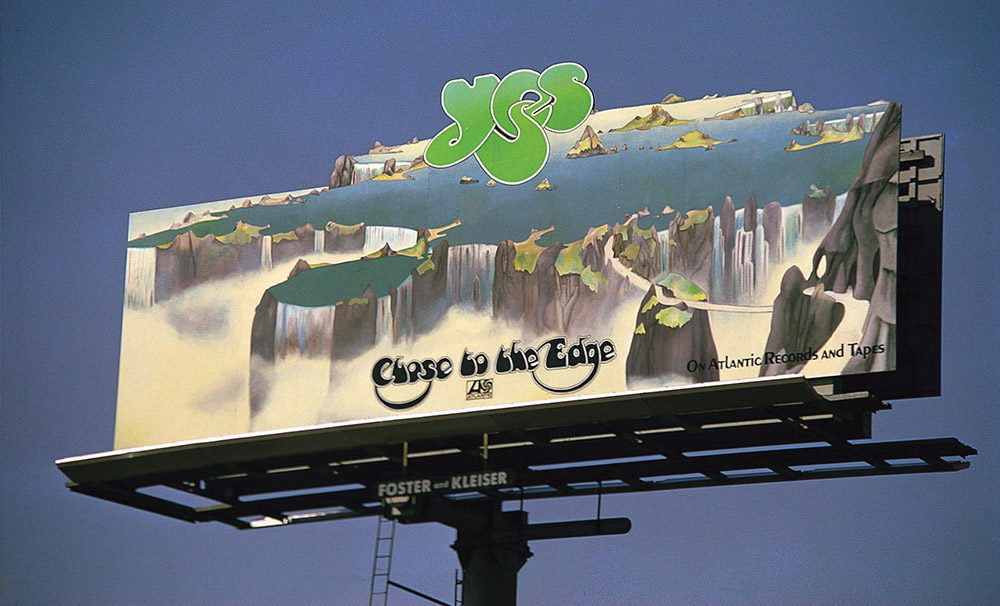
Listening to Yes is like listening to opera: the words are, or may as well be, in a different language. It’s all about the sounds: that voice, those instruments, that composition. Indeed, the music Yes made between 1971 and 1973 approached a level of elation that not many bands were able to approximate.
Context: to adequately understand the band’s masterwork, it is necessary to view it as both culmination and consummation. A lot more on the band’s development and how their individual sensibilities forged a single-minded collective that made Close to the Edge inevitable (if still inscrutable and sui generis). Even the high points of both The Yes Album and Fragile might be seen as setting the table for their tour de force; the previous two efforts a trial run for the perfection of Close to the Edge, arguably the prog-rock album for all time. Featuring the first, and by far the best, of their side-long suites, the title track of Close to the Edge is, in this writer’s opinion, as good as progressive music ever got.
So it matters less than a little that the lyrics are, supposedly, based on/inspired by Hesse’s Siddhartha (that fact is likely to get points subtracted for typical prog rock pretension, real or imagined). What matters is that this song really does go places no other band has done; or rather, it’s a gold standard that was never surpassed.
Every aspect of this, the perfect Yes song, in terms of conception and delivery, is virtually flawless: from the slow-burning build-up, to the crashing intensity of the first several minutes, to the operatic (yes I said it) majesty of the middle section, (“I get up, I get down”), to the effulgent conclusion, bringing the end right back to the beginning before fading out. On albums before and after, there were many individual moments that can be isolated and treasured, and more than a handful where the entire outfit outdoes themselves; “Close to the Edge” maintains an unprecedented (and unparalleled) force of conviction that never flags: it’s just under 19 minutes of ceaselessly renewed ecstasy.
As a case study, “And You and I” is a song where one can study every sound, every single second, and find something to savor (even after so many decades, and to the most familiar ears, it somehow manages to surprise and delight). It might be suggested Yes never sounds better, more purposeful, and more locked-in than they do on this number. Suffice it to say, both Steve Howe and the indefatigable Jon Anderson do career-best work, as though their confidence and purpose could not be contained. Throughout the proceedings there are no pauses, wasted moments or miscues: everyone assembled works in service of the songs, resulting in a unified, utterly convincing proclamation, a truly joyful noise.
“Siberian Khatru” (your guess is as good as mine) is another “mini” epic that practically turns into a pas de deux between Howe and Anderson, the latter thrusting and parrying the former’s increasingly intense and complex guitar peregrinations. In the final analysis, these three songs signify an apotheosis of prog rock and everything we can reasonably ask for from art: a triumph of vision, empathy, intelligence, and passion (that it features some of the best musicians of the genre doesn’t hurt)
Let us now praise famous men. As it pertains to all-things-prog, Yes, to invoke A Few Good Men, is the band we want on that wall; the band we need on that wall. Easy to mock, not as easy to dismiss as some might wish, they are also, perhaps more so than any band, the genre’s best citizens. Yes, during their glory years, were arguably the most compelling ambassadors for this genre, which confused, exasperated and electrified listeners like no other. Like many of their peers, they made what might lazily be described as “music for music’s sake”, but while it sacrificed nothing in terms of integrity for the pursuit of filthy lucre, it managed to attract millions of listeners for the simplest (and most pure) of reasons: it was too exceptional to be ignored.
In sum, and on a personal note: I’ve written a lot (a LOT) about prog rock, and one of the primary reasons I love it is because it inspires me, as a writer; as a dedicated non-musician this artistry remains unsullied not merely because it’s demonstrably non-commercial — it’s not reactionary, it removes itself from consideration of popularity or commerce; it’s a group of kindred spirits in pursuit of a shared vision: that simple, that impossible. And it inspires me, as a writer, because every generation is overstuffed with posers and chasers and imitators; there are those rare and precious rebels for whom originality and the cultivation of a unique style is everything that present an eternal antidote to cynicism and crass trend sniffing. Even if you could be famous would it be worth it if you were manufactured, calculated, and your soul was the price of your paycheck?
